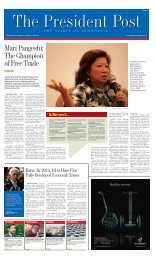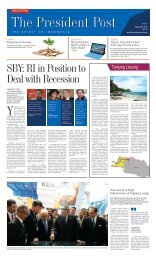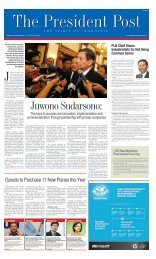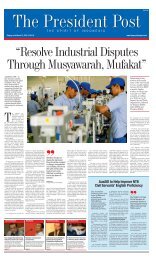28th Edition - The President Post
28th Edition - The President Post
28th Edition - The President Post
You also want an ePaper? Increase the reach of your titles
YUMPU automatically turns print PDFs into web optimized ePapers that Google loves.
B4<br />
October 12, 2011<br />
<strong>The</strong> <strong>President</strong> <strong>Post</strong><br />
www.thepresidentpost.com<br />
Executive Highlights<br />
<strong>The</strong> rupiah broke the<br />
psychological level of<br />
Rp 9,000 to the dollar<br />
in the third week of<br />
September<br />
amid global risk aversion arising<br />
from the debt crisis in Europe and<br />
a weak U.S. economy. <strong>The</strong> rupiah,<br />
which dropped to a low of<br />
Rp9,365 to the dollar at one time,<br />
was trading at a high of around<br />
Rp8,500-8,600 to the dollar just<br />
several weeks ago. Foreign ownership<br />
of Indonesian government<br />
bonds have fallen to Rp234 trillion<br />
as of 19 September (the latest<br />
data available), down 5.3% from<br />
the start of the month. <strong>The</strong> yield<br />
on the 10-year government bond<br />
has jumped 18 basis points (bp) to<br />
7.3%. Overseas investors, meanwhile,<br />
have sold a net Rp4.5 trillion<br />
in Indonesian stocks as of 21<br />
September from the start of the<br />
month. <strong>The</strong> Indonesian Stock Index<br />
(IDX) has also plunged more<br />
than 20% since reaching a record<br />
high of nearly 4,200 in early<br />
August. Traders say the current<br />
volatility is a textbook example<br />
of global funds leaving Indonesia<br />
and other emerging markets<br />
for dollar assets in risk-off mode.<br />
Bank Indonesia monetary policy<br />
director Hendar said the central<br />
bank would intervene in the<br />
markets regularly to keep the rupiah’s<br />
movement in line with regional<br />
currencies. He expects the<br />
rupiah’s recent decline to be temporary.<br />
Finance Minister<br />
Agus Martowardojo<br />
said the government<br />
could introduce<br />
a fiscal stimulus<br />
package next year<br />
as concerns mount that a slowdown<br />
in global growth could impact<br />
the Indonesian economy.<br />
Taking lessons from the 2008<br />
global financial crisis, the minister<br />
emphasized that the country<br />
needed to actively anticipate<br />
a possible slowdown in global<br />
growth. No details have been put<br />
forth on the possible fiscal stimulus<br />
package. Nonetheless, the<br />
finance ministry’s chief of fiscal<br />
policy Bambang Brodjonegoro<br />
said it would likely combine “fresh<br />
money and policies” and emphasize<br />
creating sources for domestic<br />
growth both in terms of consumption<br />
and investment. As a comparison,<br />
in 2008 the government<br />
launched a Rp73 trillion stimulus<br />
package to mitigate the impact of<br />
the global economic slowdown.<br />
<strong>The</strong> package involved government<br />
spending and fiscal incentives in<br />
the form of government-born import<br />
duties, value-added and income<br />
taxes to revive business<br />
activity. At the time Indonesian<br />
growth declined from 6.1% y-o-y<br />
in 2008 to 4.5% in 2009. <strong>The</strong> government<br />
has yet to revise its official<br />
forecast of 6.5% y-o-y growth<br />
this year and 6.7% growth in<br />
2012. However, a worst case scenario<br />
projection by the trade ministry<br />
has growth slowing to 6.2%<br />
this year and 5.2% in 2012.<br />
Investors from China’s<br />
Jilin Province signed<br />
nine deals worth<br />
US$9.5 billion in<br />
Indonesia<br />
during an economic and trade<br />
conference earlier this month.<br />
<strong>The</strong> signing was witnessed by<br />
chief economic minister Hatta<br />
Rajasa and investment board<br />
(BKPM) chairman Gita Wirjawan.<br />
<strong>The</strong> deals included a US$6 billion<br />
nickel smelter facility in Southeast<br />
Sulawesi by Jilin HOROC<br />
Nonferrous Metal Group. This<br />
project will include a smelter with<br />
a capacity of 100,000 tons of nickel-in-matte<br />
and a 1,000 MW coalfired<br />
power plant to support the<br />
smelter. Construction of the facility<br />
will be financed by the Bank of<br />
China. Other projects signed during<br />
the conference included investments<br />
in the mining, agricultural,<br />
pharmaceuticals and food<br />
and beverages sectors. Jilin provincial<br />
government representative<br />
Sun Zhengcai said the deals<br />
reflected efforts by businesses in<br />
Northeast China to expand into<br />
Southeast Asia’s largest economy.<br />
State power utility<br />
PLN has appointed<br />
Barclays Capital and<br />
Citi to arrange a<br />
planned US$2 billion<br />
global bond issue.<br />
PLN finance director Setio Anggoro<br />
Dewo said the firm was looking<br />
to raise the funds this year,<br />
and plans to meet with a number<br />
of global fixed income investors in<br />
a road show starting 27 September.<br />
He said a final decision on<br />
whether to issue the global bonds<br />
would depend on demand and<br />
conditions in the currently volatile<br />
global financial markets. <strong>The</strong><br />
funds will be allocated to finance<br />
a 10,000 MW power plant expansion<br />
program that PLN is currently<br />
undertaking. Projects in the<br />
pipeline include the Indramayu<br />
2,000 MW coal-fired power facility<br />
in West Java; the 110 MW Hulu<br />
Lais coal-fired plant in Bengkalis,<br />
Riau; the 110 MW Sungai<br />
Penuh coal-fired facility in Jambi;<br />
the Kotamobagu 80 MW coalfired<br />
plant in North Sulawesi; and<br />
the Tulehu 20 MW coal-fired facility<br />
in Ambon, Maluku. PLN has a<br />
credit rating of BB from Standard<br />
& Poor’s, Ba1 from Moody’s and<br />
BB+ from Fitch.<br />
Engineering firm<br />
Petrosea has signed<br />
an eight-year coal<br />
mining contract with<br />
Admitra Baratama<br />
Nusantara worth<br />
US$930 million.<br />
<strong>The</strong> new contract is a revision to<br />
an earlier five-year deal signed in<br />
2009, worth around US$200 million,<br />
for mining services at Admitra’s<br />
mine in Sanga-Sanga, East<br />
Kalimantan. Admitra produced<br />
three million tons of coal in 2010<br />
from Sanga-Sanga and is looking<br />
for Petrosea to help boost production<br />
to four million tons this<br />
year and five million tons in 2012.<br />
Petrosea said the latest deal represented<br />
its largest contract to<br />
date and would provide a significant<br />
boost to its revenue stream<br />
from mining services. <strong>The</strong> company<br />
also provides mining services<br />
to coal miners Gunung Bayan<br />
Pratama and Santan Batubara.<br />
Petrosea is a subsidiary of integrated<br />
energy firm Indika Energy.<br />
India’s GMR Energy<br />
has acquired a 30%<br />
stake in local coal<br />
miner Golden Energy<br />
Mines in a deal worth<br />
US$550 million.<br />
As part of the agreement, GMR<br />
Energy will be able to purchase<br />
up to 10 million tons per year over<br />
the next 25 years. GMR Energy<br />
chief executive officer Raaj Kumar<br />
said the deal would provide<br />
the Indian firm access to quality<br />
coal from one of the lowest cost<br />
producers in Indonesia. He added<br />
that the deal would also provide it<br />
with fuel security for its plants in<br />
India that are under construction.<br />
Golden Energy Mines has three<br />
coal blocks in Kalimantan and<br />
two blocks in Sumatra with coal<br />
reserves totaling more than 860<br />
million tons and coal resources<br />
estimated at more than 1.9 billion<br />
tons. It currently exports<br />
coal to China and India with a client<br />
base that includes Sumitomo<br />
Corp., Glencore International and<br />
Ace Trading Group. Golden Energy<br />
Mines is affiliated with Indonesian<br />
conglomerate the Sinar Mas<br />
Group.<br />
Thailand-based<br />
Siam Cement will<br />
acquire a 30% stake<br />
in top petrochemical<br />
producer Chandra<br />
Asri for US$442<br />
million.<br />
Siam Cement will purchase a 23%<br />
stake in Chandra Asri from Singapore<br />
sovereign wealth fund Temasek<br />
Holdings. <strong>The</strong> remaining<br />
7% stake will be purchased from<br />
diversified conglomerate Barito<br />
Pacific. <strong>The</strong> latter will retain<br />
a majority 65% shareholding in<br />
Chandra Asri following the deal.<br />
Siam Cement said the acquisition<br />
represented a unique opportunity<br />
to invest in Indonesia’s leading<br />
petrochemical franchise and<br />
further expand its business in a<br />
highly attractive growth market.<br />
<strong>The</strong> Thai firm also owns a polyvinyl<br />
chloride (PVC) plant in Indonesia<br />
with a capacity of 120,000 tons<br />
per year. Chandra Asri currently<br />
operates Indonesia’s only cracker,<br />
producing 520,000 tons of petrochemical<br />
products including polyethylene,<br />
polypropylene, styrene<br />
monomer and various other olefins.<br />
Siam Cement is also reportedly<br />
in talks to purchase Indonesian<br />
chemical producer Sulfindo<br />
Adiusaha in a potential US$700<br />
million deal.<br />
Scorpa Pranedya<br />
has been awarded<br />
an engineering,<br />
procurement and<br />
construction (EPC)<br />
<br />
<br />
<br />
<br />
<br />
<br />
<br />
<br />
<br />
<br />
<br />
<br />
<br />
<br />
<br />
<br />
<br />
<br />
<br />
<br />
<br />
<br />
<br />
<br />
<br />
<br />
<br />
<br />
<br />
<br />
<br />
<br />
<br />
<br />
<br />
<br />
<br />
<br />
<br />
<br />
<br />
<br />
<br />
<br />
<br />
<br />
<br />
<br />
<br />
<br />
<br />
<br />
<br />
<br />
<br />
<br />
<br />
<br />
<br />
<br />
<br />
<br />
<br />
<br />
<br />
<br />
<br />
<br />
<br />
<br />
<br />
<br />
<br />
<br />
<br />
<br />
<br />
<br />
<br />
<br />
<br />
<br />
<br />
<br />
<br />
<br />
<br />
<br />
<br />
<br />
<br />
<br />
<br />
<br />
<br />
contract worth<br />
US$255 billion for<br />
the Cepu Oil and Gas<br />
Block.<br />
<strong>The</strong> contract was announced by<br />
upstream oil and gas regulator<br />
BP Migas, and is for one of five<br />
supporting infrastructure facilities<br />
needed to take the block to<br />
full production capacity. Cepu<br />
operator Exxon Mobil has already<br />
awarded a US$750 million EPC<br />
contract to a consortium led by<br />
Samsung Engineering and Tripatra<br />
Engineering to support infrastructure<br />
development at the oil<br />
and gas field. Cepu currently produces<br />
around 20,000 barrels per<br />
day (bpd) of crude oil. <strong>The</strong> new<br />
infrastructure facilities are slated<br />
to boost Cepu’s production to<br />
165,000 bpd over the next several<br />
years.<br />
French oil and gas<br />
giant Total has signed<br />
a deal with canadian<br />
producer Talisman<br />
Selected Instant Indicators<br />
<br />
<br />
<br />
<br />
<br />
<br />
<br />
<br />
<br />
<br />
<br />
<br />
<br />
<br />
<br />
<br />
<br />
<br />
<br />
<br />
<br />
<br />
<br />
<br />
<br />
<br />
<br />
<br />
<br />
<br />
<br />
<br />
<br />
<br />
<br />
<br />
<br />
<br />
<br />
Energy to farm into<br />
three deep-water<br />
blocks in Indonesia.<br />
Under the agreement, Total will<br />
a acquire a 50% interest in the<br />
Sageri production sharing contract<br />
(PSC), a 35% interest in the<br />
South Sageri PSC and a 20% interest<br />
in the Sadang PSC. All<br />
three blocks are located in an area<br />
of 10,700 km in the Makassar<br />
Straits between Sulawesi and Kalimantan,<br />
in water depths ranging<br />
from 400-2000 m. <strong>The</strong> deal<br />
sees Total committing to extensive<br />
seismic plans and a program<br />
of exploration wells with an initial<br />
spud expected before the end<br />
of the year. Jean-Marie Guillermou,<br />
Total’s senior VP for Asia Pacific<br />
exploration and production,<br />
said the latest acquisition reflects<br />
its strategy to further expand its<br />
acreage in new exploration areas<br />
in deep offshore and to continue<br />
investing in Indonesia. Total<br />
is the largest gas producer in<br />
Indonesia, with the bulk of production<br />
currently coming from its<br />
Mahakam PSC offshore East Kalimantan.<br />
State miner Tambang<br />
Batubara Bukit<br />
Asam has secured a<br />
US$220 million loan<br />
facility from Bank<br />
Negara Indonesia<br />
(BNI).<br />
Company spokesman Achmad<br />
Sudarto said the funds would be<br />
used to construct the Banjasari<br />
2x110 MW coal-fired power facility<br />
near Lahat, South Sumatra.<br />
<strong>The</strong> power facility will be used to<br />
support Bukit Asam’s coal mine<br />
expansion in the area. Achmad<br />
said the China National Electric<br />
Engineering Co. has been awarded<br />
the engineering, procurement<br />
and construction (EPC) contract<br />
for the power facility. Local engineering<br />
firm Citracontrac has<br />
been awarded the contract to<br />
build the plant’s transmission infrastructure.<br />
<strong>The</strong> Banjarsari facility<br />
is scheduled to start commercial<br />
operations in 2014. Bukit<br />
Asam is looking to boost coal production<br />
to 50 million tons per<br />
year over the next five years from<br />
around 12 million tons per year<br />
currently.<br />
Leading Chinese<br />
heavy equipment<br />
manufacturer Sany<br />
Group said it would<br />
invest US$200<br />
million for a new<br />
production facility in<br />
Indonesia.<br />
<strong>The</strong> group said it plans to make<br />
Indonesia its base for manufacturing<br />
mining, construction and<br />
heavy equipment for the Southeast<br />
Asian and Australian market.<br />
<strong>The</strong> plant will be built in the<br />
Karawang industrial estate in a<br />
venture with local firm Jakarta<br />
International Machinery Center<br />
(Jimac). <strong>The</strong> latter is also the<br />
authorized distributor for Sany’s<br />
products. <strong>The</strong> Chinese firm<br />
said the Karawang facility would<br />
produce a range of items including<br />
concrete machinery, excavators,<br />
crawler and truck cranes,<br />
pile driving machinery, machinery<br />
for highway construction and<br />
machinery for the ports. Jimac<br />
president director Benny Kurniajaya<br />
said the venture aimed to sell<br />
300-500 units per year in the domestic<br />
market over the next several<br />
years.<br />
Astratel Nusantara<br />
has acquired a 95%<br />
stake in an East Java<br />
toll road in a Rp750<br />
billion deal.<br />
<strong>The</strong> 40.5-km toll road links Kertosono<br />
and Mojokerto, two cities<br />
located near East Java’s major<br />
urban center Surabaya. <strong>The</strong><br />
controlling stake was acquired<br />
from local firm Natpac Graha<br />
Arthamas. <strong>The</strong> Kertosono-Mojokerto<br />
toll road forms part of the<br />
Yogyakarta-Solo-Surabaya corridor<br />
of the Trans Java highway.<br />
<strong>The</strong> acquisition adds to Astratel’s<br />
current portfolio of toll roads,<br />
which includes the 72.5-km toll<br />
road linking Merak and Serpong<br />
in Banten and the 12.5-km toll<br />
road linking Serpong and Kunciran<br />
near Tangerang. Astratel<br />
is a subsidiary of diversified conglomerate<br />
Astra International.<br />
Company spokesman Arief Istanto<br />
said the acquisition reflects the<br />
Astra Group’s strategy to expand<br />
into the toll road and infrastructure<br />
sectors.<br />
British American<br />
Tobacco (BAT) raised<br />
Rp740 billion from<br />
its 13.4% stake sale<br />
in cigarette producer<br />
Bentoel Internasional<br />
Investama to UBS AG.<br />
BAT will retain an 86% stake in<br />
Bentoel following the deal. BAT<br />
acquired the cigarette maker from<br />
the Rajawali Group in 2009. Bentoel<br />
is currently Indonesia’s thirdlargest<br />
cigarette producer, representing<br />
around eight percent of<br />
Indonesia’s 300 billion cigarettes<br />
per year market. <strong>The</strong> company<br />
reported revenues of Rp4.7 trillion<br />
for the first half of the year,<br />
up 8% from a year earlier. Bentoel’s<br />
profits for the period totaled<br />
Rp235 billion, more than double<br />
the Rp113 billion posted in 2010.<br />
Business Highlights<br />
are contributed to<br />
<strong>The</strong> <strong>President</strong> <strong>Post</strong><br />
by CASTLEASIA/<br />
PT Jasa Cita from<br />
information supplied<br />
to members of their<br />
CEO Forum, the<br />
Indonesia Country<br />
Program. <strong>The</strong>y are<br />
reprinted here with<br />
permission. For<br />
more information<br />
about CASTLEASIA<br />
programs, please<br />
contact Juliette or<br />
Wijayanti at 62 21<br />
572 7321 or email<br />
castle@castleasia.<br />
com subject CEO<br />
Forum








